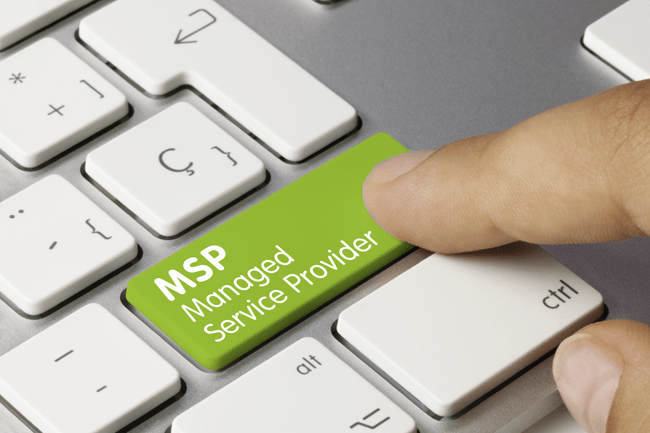
CYBER SECURITY | 7 MIN READ
While there are multiple types of Managed Service Providers, in this article we will cover how specifically a Managed Service Provider for IT monitors for and removes cyber threats, ensures data security and data privacy regulatory compliance, maximizes network uptime and efficiency, helps you plan for the future, and more. As a Managed IT Service Provider, we aim to educate our audience about our industry to de-mystify and simplify common topics, seeing as IT content can quickly become technical. Keep reading to learn the full scope of how a Managed IT Service Provider can work with and benefit your business.
Not enough time? Jump to:
Monitor for and Remove Cyber Threats
Ensure Data Privacy Compliance
Monitor for and Remove Cyber Threats

What Cyber Threats Do MSP's Monitor For?
When a Managed Service Provider monitors your network, there are countless types of cyber threats that they look for. They neutralize many of these threats using a combination of various cyber security software.
Threats that MSP's monitor for include:
- Phishing− Phishing involves attempts to gain access to a victim's personal accounts or capture their sensitive data by tricking them into revealing passwords or personal information. The most common form of phishing takes place over email.
-
Malware− Malware is any type of software written with malicious intent that tends to be spread when a suspicious link or download is opened by a victim. Listed below are the different types of malware.
-
- Virus− Viruses latch onto and infect "clean files" in your computer before moving onto the next. Computer viruses cannot be spread without human interaction, for instance opening an infected file.
- Worms− A worm is a type of virus, but the difference is that worms can spread without any human action needed. Worms can quickly multiply and spread, which can magnify the damage done.
- Bots/Botnet− Bots are automated processes designed to infect a victim's device and connect these infected devices back to a central system called a botnet. Once botnets establish a web of connected and infected devices, it can send out broad, "remote control-based" attacks to its entire network.
- Trojans− A Trojan is an innocent-looking program that, when downloaded, opens a virtual "back door" in your device's security, allowing malware to come in and infect it. Like viruses, Trojans require human interaction to spread.
- Ransomware− Ransomware encrypts personal or company data and holds it for ransom. Hackers then will threaten to publish, destroy or sell the information on the dark web if their monetary demands are not met.
- Spyware− Spyware is designed to spy on you and collect information such as passwords and credit card numbers. Once this information is taken, it can have harmful consequences for the victim, such as identity theft and credit card fraud.
- Adware− Adware uses information it has collected on you, such as your browsing history, to serve you targeted ads. Though adware is relatively harmless, it can potentially create a security gap that allows other more harmful versions of malware into your network.
-
RELATED: How Does Ransomware Work? [Infographic]
How Do MSP's Monitor For and Remove Cyber Threats
Network Assessments
One of the first things that a Managed Service Provider will do is perform a network assessment to find weak points such as security gaps in your company's network.
This includes evaluating employee computer behavior. For instance, they may look to see which employees have administrator privileges, what restrictions are in place to control employee Internet usage, etc.
A Managed Service Provider will use this assessment to determine next steps, such as what gaps need to be patched and what cyber security software needs to be installed.
Based on their evaluation of your employees, they can also build a customized cyber security educational course to teach best practices. This can include phishing tests and more.
Software Installations
Once the network assessment is completed, an MSP will put their plan into action by installing a variety of necessary security hardware and software. This can include anything from firewalls and new employee computers to email filtering and endpoint protection software.
Network management software allows an MSP to efficiently view your network infrastructure from a birds' eye view to quickly identify and remove cyber threats that pop up.
RELATED: Securing Company Data- How an MSP Can Help
Minimize Downtime
Consistent Data Backups
Regularly scheduled data backups ensure that, in the event of a network outage, your company doesn't experience severe downtime. When your network goes down, you may have to restore it to the most recent backup, especially in the event of a ransomware attack.
In a scenario like this, if your company isn't regularly scheduling backups, you may have to restore your network to an older backup from days or potentially even weeks ago. Think of how your company would be negatively impacted if you lost all the work and files from the past few days or few weeks!
Additionally, the costs of downtime can quickly add up for every hour that your company is offline. Thankfully, an MSP can automate your backups so they're completed as often as possible.
BCDR Plan Creation
A Backup Continuity and Disaster Recovery (BCDR) plan ensures that in the event of a network outage, downtime is kept to a minimal and your network is restored to the most recent backup quickly.
An MSP can create and implement a BCDR plan for you. Along with taking steps like automating your backups, MSP's can also create fail-over servers if your company has multiple offices. For instance, if your headquarters' network were to go down, you could re-direct that office's traffic through another office's servers.
MSP's can help your company designate a chain of command in the event of a ransomware attack or other severe network issue. If an employee spots an issue in your network, they should know who to contact to get the issue resolved. Having a chain of command set up minimizes confusion in the event of a major issue and can help problems get resolved easier and faster.
Regularly Scheduled Software Updates
Keeping software updated regularly is a crucial step in minimizing downtime. An MSP can schedule automated software updates, which will patch any security gaps left in your network, protecting your business from other cyber threats like malware and bugs.
The less security gaps there are in your network, the less of a chance that your network will experience a breach or ransomware attack that can lead to subsequent downtime.
RELATED: How MSP's Minimize Downtime
Vendor Management
What is Vendor Management?
Vendor management is a process that occurs before and after a contract is signed with a vendor to ensure the best pricing, offering, and customer service. Before a contract is signed, companies may scour the market to determine the best vendors by comparing factors such as pricing and offerings.
Once a contract is signed, businesses will manage the relationship with their vendors to ensure that they obtain the best pricing, performance standards are met or exceeded, and a roadmap for the future of the contract is planned, for instance any necessary upgrades down the road.
However, managing the relationships with all of these vendors can become time-consuming, which is why some businesses prefer to outsource this business-critical task to a third-party company.
How an MSP Can Help
A Managed IT Service Provider can oversee your business' relationships with a variety of technology vendors. Since MSP's have in-depth knowledge about cyber security and technology in general, they can help your business aptly identify its needs and wants in a technology vendor and then find suitable candidates for the job.
An MSP can take the burden off their clients by personally working with these vendors. Since MSP's manage your network functionality and security, naturally it makes sense for them to work with the vendors that ensure these points.
Additionally, since Managed Service Providers already have established relationships and partnerships with some of the best vendors in the industry, they can typically get your business better pricing on products and services than your business could get by yourself.
The following list comprises the main types of technology vendors that MSP's typically work with:
- Business Phone Providers
- Copier Manufacturers
- Website Hosting Platforms
- Cable or Internet Providers
- Cloud Storage Providers
- Line of Business Applications (SalesForce, QuickBooks, etc.)
- Cyber Security Software Providers (firewall, antivirus, anti-ransomware, etc.)
RELATED: Vendor Management: What Is It and How Can MSP's Help?
Ensure Data Privacy Compliance
Cyber Attack Protection
When your business is the victim of a cyber attack, for instance a phishing scam or a ransomware attack, sensitive data can be stolen, which can put you in violation of certain data privacy laws and could also potentially lead to lawsuits.
By implementing software and hardware that secures your network, the risk of sensitive data being compromised is greatly reduced, which minimizes the chances of data being accessed, which can break data privacy regulations.
Implementation of Real-Time Alerts
Certain data privacy regulations such as GDPR set stringent requirements for the timeframe in which businesses affected by a data breach must contact certain parties.
Businesses who fail to send the required notifications within the specific timeframe may be subject to a number of penalties. An MSP can help your business avoid penalties by enabling real-time data breach alerts across your network.
Centralized Security Management
When an un-authorized third party accesses your data, your business may be in violation of certain data privacy regulations. By centralizing the management of your network's security, an MSP minimizes a malicious third party's opportunities to access sensitive data.
vCIO Consultations
vCIO's, or virtual Chief Information Officers, are responsible for the strategic planning and overall management of a company's cyber security plan.
From a compliance standpoint, a vCIO can audit your network for weak spots and make recommendations based on important developments in data privacy regulations, cyber law, and cyber threats. vCIO's figure out how to make updates to your network as a means of reaching overarching company goals.
RELATED: Data Privacy Compliance- How MSP's Can Help
Maximize Efficiency

Plan Moves and Expansions
If your office is adding new employees, everyone needs workstation equipment such as a desktop and phone, and has to be set up on your network. An MSP can plan and manage the implementation of workstations and business phones to ensure a smooth transition once the new office opens.
If your office is opening in a brand new building that's under construction, an MSP can work with building architects and construction companies to accept low voltage bids, which allows them to help manage the installation of cables and wiring in your new office to best serve the network that will be installed.
For instance, cable and wiring management can be used to route Internet and power most efficiently to cubicles, wireless access points, and more. Besides cabling and wiring, an MSP can also work with the construction company to plan the installation of other technology such as security cameras and keycard access.
Take Your Office Remote
An MSP can manage the entire remote transition from start to finish. They can:
- Set up and configure VPN's− This step secures the connection between remote devices and your office's network.
- Set up remote conferencing platforms− This step ensures that effective communication still happens while employees are working remotely.
- Ensure that data is encrypted and files are securely shared− This step can involve searching for and patching security gaps within your network, for instance in your ports.
- Build a Business Continuity and Disaster Recovery (BCDR) plan− BCDR plans mitigate the risks associated with a network outage by setting protocol that will enable a quick return to full network functionality.
Network Upgrades
Regular upgrades and maintenance are crucial for your network's health and functionality. Over time, when upgrades and maintenance aren't regularly completed, your network may begin to run slower, and as less security gaps are patched, your network may begin to be less protected from hackers.
An MSP can work with your business to schedule periodic hardware and software upgrades to build a technology roadmap.
This will keep your network running optimally and securely with an eye on the future. Some MSP's have upgrades built into your contract, which ensures that your office gets the latest technology.
RELATED: Project Management [How MSP's Can Help]
We hope that this blog answered your questions. Are you interested in managed IT services but don't know if your business is the right fit for it? Check out our blog that lists the top 7 characteristics of businesses that are a good fit.
Want to be notified about our latest IT and office technology blogs? Subscribe now!
Posted by Andre Schafer

Andre Schafer is a Technical Account Manager at Standard Office Systems. He has spent his entire career in the Office Technology and IT fields. For nearly 30 years, he has held various roles, including Technician, Trainer, Analyst, and Account Manager. Andre’s focus has always been to understand his customers' business needs to provide the appropriate technologies and services.




